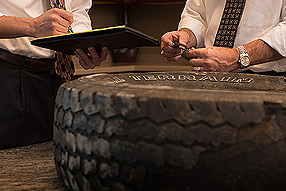Should Your Tires Be Retired?
June 16, 2014 / Vehicle Accidents
Your car or truck wouldn’t be of much use to you if it didn’t have tires, would it? And yet we often don’t give tires much thought, so long as they don’t go flat. Even then, we’ve got that trusty spare that has been riding around in the trunk for years and doesn’t have any mileage on it at all. So, no problem, right? Wrong.
See Also: Tire Troubles & Accident Litigation
For the most part, drivers measure the road-worthiness of their tires by the amount of tread left on them. And that is one credible factor to consider. With the normal amount of driving, the tires’ tread wears out before the rubber itself deteriorates.
But tires can deteriorate with age, just like people, even if they haven’t seen hard use and still have plenty of visible tread left. Maybe you have dug a rubber band out of the back of the desk drawer only to have it snap as soon as you stretched it. That’s because rubber deteriorates over time, even if it’s just lying unused in a drawer . . . or stored in a hot trunk or mounted under a vehicle. Other factors, such as exposure to sunlight and coastal climate, accelerate the aging process of tires. And, of course, hitting the curb too many times doesn’t do them any good, either.
Tire Age & Car Accidents
Research conducted by Safety Research & Strategies, Inc., found 252 incidents in which tires older than six years experienced tread / belt separations—most resulting in loss-of-control and rollover crashes. These incidents were the cause of 233 fatalities and 300 injuries. SRS submitted the data to the National Highway Traffic Safety Administration in 2012, but the agency has yet to issue a final rule on tire aging.
 We all know that putting a new set of tires on a vehicle means a significant outlay of cash. This is why many consumers choose to buy used tires. They look fine, and the merchant assures the buyer that they’re getting a great deal because the tires have never been used and are “just like new.” Don’t be fooled by a persuasive salesman. Our office is currently helping a client who purchased a used tire without being told that it was eight years old. The tire failed, causing an accident that killed two and critically injured several others.
We all know that putting a new set of tires on a vehicle means a significant outlay of cash. This is why many consumers choose to buy used tires. They look fine, and the merchant assures the buyer that they’re getting a great deal because the tires have never been used and are “just like new.” Don’t be fooled by a persuasive salesman. Our office is currently helping a client who purchased a used tire without being told that it was eight years old. The tire failed, causing an accident that killed two and critically injured several others.
Is there a way to tell the age of a tire? Yes, but it takes a little deciphering. Federal law requires that every tire sold in the U.S. be marked with a Tire Identification Number, and buried in this sequence of numbers is a code identifying when the tire was manufactured. For a tire made after 2000, the last four numbers of the TIN represent the week and year of its birth. For example, the numbers 2610 would tell us the tire was manufactured in the 26th week of the year 2010.
The code numbers for tires made before 2000 are differently configured – and you shouldn’t even consider driving on tires that old.
Many sales people, especially those in big box stores, don’t know about recommended tire age limits or how to tell the age of a used tire. A few years ago, an investigative reporter went undercover in Kansas City and found out that nine out of ten service techs were unable to tell the age of a tire or to identify the danger of an aged tire. That included employees of some of the country’s largest tire retailers, like Walmart.
What are the take-away tips that can keep you and your family safe?
- If you drive only rarely, or maybe have a classic car that doesn’t get out on the road often, replace the tires after six years, even if they look fine.
- Replace the spare tire at the same time you replace the others.
- If you’re shopping for used tires, check the age encoded in the TIN; make sure they have a good amount of tread left and that they have worn evenly.
- If you live in a hot or coastal state, be aware that your tires may age more quickly than those in other locations.
Mike Stephenson, Indianapolis car accident lawyer with Stephenson Rife, has been helping Indiana accident victims for more than 30 years. If you are involved in a motor vehicle accident that may have been due to bad tires, call 1-317-825-5200 for a free consultation.

 Mike Stephenson has 40 years of experience and is a trusted advisor to many individuals and companies. His current practice is dominated by civil litigation in state and federal courts. He focuses much of his time on handling catastrophic injuries caused by all types of accidents, including motor vehicle, trucking, workplace injuries, product liability, and fire, just to name a few. He also works extensively in construction accidents. [
Mike Stephenson has 40 years of experience and is a trusted advisor to many individuals and companies. His current practice is dominated by civil litigation in state and federal courts. He focuses much of his time on handling catastrophic injuries caused by all types of accidents, including motor vehicle, trucking, workplace injuries, product liability, and fire, just to name a few. He also works extensively in construction accidents. [ 